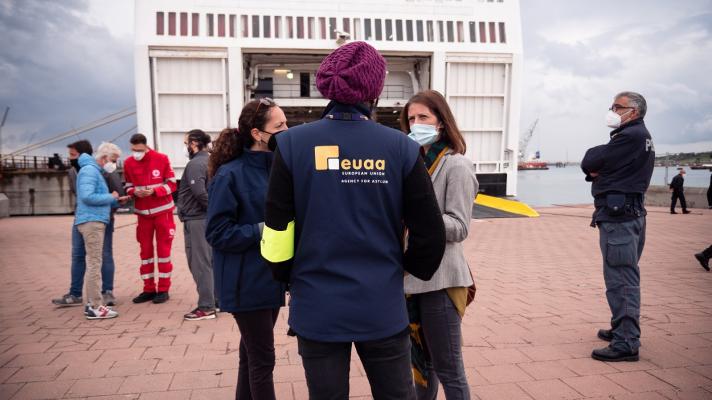The European Commission supports Italy in the entire migration management process - from managing arrivals, guiding migrants through relevant procedure and helping them to integrate into society, to organising transfers to another EU country or returns to the country of origin. This support is provided through EU funding and expertise, including the deployment of staff members permanently based in Rome, alongside the permanent presence of EU agencies (Frontex, EUAA and Europol).
Operational support
European Commission staff members
The European Commission staff members in Italy cooperate with the Italian authorities, EU agencies and other relevant stakeholders to ensure effective migration management and follow-up to disembarkations, including following search and rescue operations. They also coordinate voluntary relocations of asylum seekers from Italy to pledging EU countries and Schengen associated countries.
European Border and Coast Guard Agency - Frontex
Frontex supports Italy with:
- border control
- border surveillance
- search and rescue activities in the Central Mediterranean through Joint Operation Themis
It carries out its operations within the area of the Central Mediterranean Sea, covering routes from Algeria, Tunisia, Libya, Egypt, Turkey and Albania. The staff deployed by Frontex also supports the Italian authorities in the registration and screening of migrants and asylum seekers.
European Union Agency for Asylum (EUAA)
The European Union Agency for Asylum provides support to Italy’s asylum and reception system. This includes:
- capacity building
- supporting asylum registrations
- harmonisation and improvements of asylum procedures
- support to management of judicial backlog
- improving reception standards
- improving voluntary relocation process
Europol
Europol staff deployed in Italy supports Italian law enforcement authorities on investigations, with intelligence gathering focusing on counter-smuggling and counter-terrorism.
Migration management in action
The European Commission, together with EU agencies and other relevant stakeholders, contributed to the development of the “Hotspot Standard Operating Procedures”. The document was adopted by the Italian Ministry of Interior in 2016, following the “European Agenda on Migration” issued by the Commission in 2015, and it is line with Frontex Regulation provisions on “hotspots” areas”.
Hotspot Standard Operating Procedures are guidelines to ensure a standardised and efficient management of migrant arrival procedures. Italian authorities and other concerned stakeholders use them at hotspotareas(Lampedusa, Trapani, Pozzallo e Taranto) and at other places where migrants disembark after their journey at sea. These guidelines also include preventive and protective measures to ensure appropriate sanitary requirements, such as COVID-19 protective measures. Frontex also assist with migration management at hotpots based on the rules set out in the Frontex Regulation.
The implementation of the Hotspot Standard Operating Procedures is supported through the EU Regional Taskforce (EURTF) in Catania, which is chaired by the European Commission and includes EU agencies and relevant national authorities.
The European Union Regional Task Force was set up in Catania in June 2015, as part of the “hotspot approach” recommended by the European Commission in the “European Agenda on Migration” adopted in 2015.
The EURTF is chaired by the Commission and its role is to coordinate the work of the EU agencies (Frontex, EUAA and Europol) and the relevant national authorities involved in migration management in Italy.
EURTF members meet every two weeks to share information and discuss main points of interest for actors at the European, national and regional level, including on-going search and rescue operations at sea, counter-smuggling and trafficking initiatives and other operational highlights and priorities.

